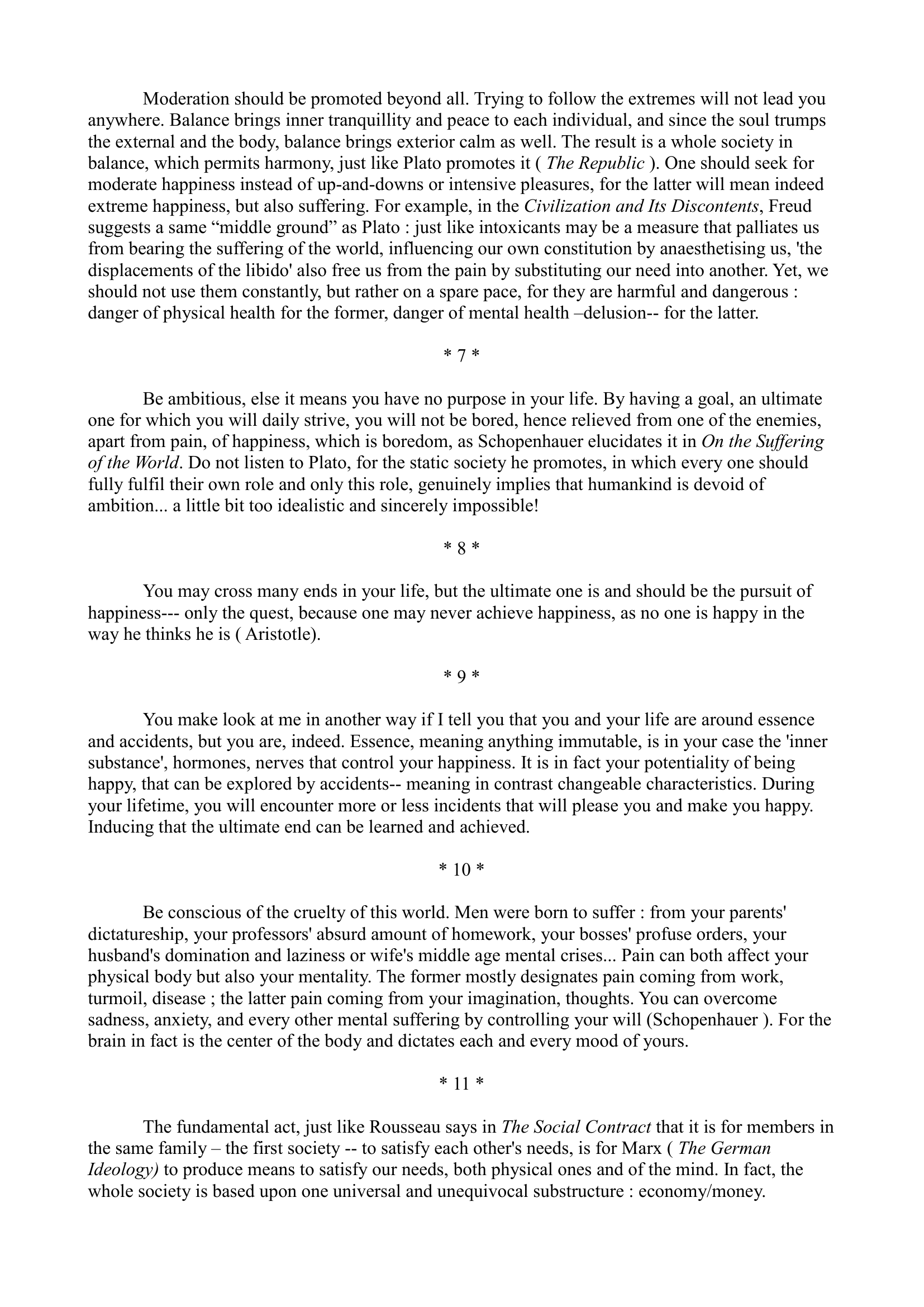what is a good life
Publié le 02/02/2012

Extrait du document
Do not regret your past choices. The past is the past, thinking all over it again will only haunt your present days, hence make you unhappy, for you will always ask yourself the same question : 'what if?' or repeat the same particle 'I should have...' . Instead of drowning yourself in the old times, you should probably think of how to make the present “full”, satisfactory enough in order for you to not think about it in the future and regret it too. A patient on the edge of dying because of a disease that could have been prevented will probably lament in his bed : 'I should have been more careful in my old days and led a healthy life instead of taking drugs, smoking, eating junk food, drinking... ' Too late dummy! You should have thought about it when you made that choice! Now, you should rather concentrate on how to extend your life and making it meaningful.
«
Moderation should be promoted beyond all.
Trying to follow the extremes will not lead you
anywhere.
Balance brings inner tranquillity and peace to each individual, and since the soul trumps
the external and the body, balance brings exterior calm as well.
The result is a whole society in
balance, which permits harmony, just like Plato promotes it ( The Republic ).
One should seek for
moderate happiness instead of up- and-downs or intensive pleasures, for the latter will mean indeed
extreme happiness, but also suffering.
For example, in the Civilization and Its Discontents , Freud
suggests a same “middle ground” as Plato : just like intoxicants may be a measure that palliates us
from bearing the suffering of the world, influencing our own constitution by anaesthetising us, 'the
displacements of the libido' also free us from the pain by substituting our need into another.
Yet, we
should not use them constantly, but rather on a spare pace, for they are harmful and dangerous :
danger of physical health for t he former, danger of mental health –delusion-- for the latter.
* 7 *
Be ambitious, else it means you have no purpose in your life.
By having a goal, an ultimate
one for which you will daily strive, you will not be bored, hence relieved from one of the enemies,
apart from pain, of happiness, which is boredom, as Schopenhauer elucidates it in On the Suffering
of the World.
Do not listen to Plato, for the static society he promotes, in which every one should
fully fulfil their own role and only this role, genuinely implies that humankind is devoid of
ambition...
a little bit too idealistic and sincerely impossible!
* 8 *
You may cross many ends in your life, but the ultimate one is and should be the pursuit of
happiness --- only the quest, because one may never achieve happiness, as no one is happy in the
way he thinks he is ( Aristotle).
* 9 *
You make look at me in another way if I tell you that you and your life are around essence
and accidents, but you are, indeed.
Essence, meaning anything immutable, is in your case the 'inner
substance', hormones, nerves that control your happiness.
It is in fact your potentiality of being
happy, that can be explored by accidents -- meaning in contrast changeable characteristics.
During
your lifetime, you will encou nter more or less incidents that will please you and make you happy.
Inducing that the ultimate end can be learned and achieved.
* 10 *
Be conscious of the cruelty of this world.
Men were born to suffer : from your parents'
dictatureship, your professor s' absurd amount of homework, your bosses' profuse orders, your
husband's domination and laziness or wife's middle age mental crises...
Pain can both affect your
physical body but also your mentality.
The former mostly designates pain coming from work,
tur moil, disease ; the latter pain coming from your imagination, thoughts.
You can overcome
sadness, anxiety, and every other mental suffering by controlling your will (Schopenhauer ).
For the
brain in fact is the center of the body and dictates each and ever y mood of yours.
* 11 *
The fundamental act, just like Rousseau says in The Social Contract that it is for members in
the same family – the first society -- to satisfy each other's needs, is for Marx ( The German
Ideology) to produce means to satisfy our needs, both physical ones and of the mind.
In fact, the
whole society is based upon one universal and unequivocal substructure : economy/money..
»
↓↓↓ APERÇU DU DOCUMENT ↓↓↓
Liens utiles
- How to live a good life according to aristotle and kant
- “What Good Is This Thing Called Intelligence and Why Bother to Measure It?” Hilliard Response
- Growing up is discovering what life is really
- Ideology and Rationality in the History of the Life Sciences
- Subject: What are the impacts of racism on black people in the United States




